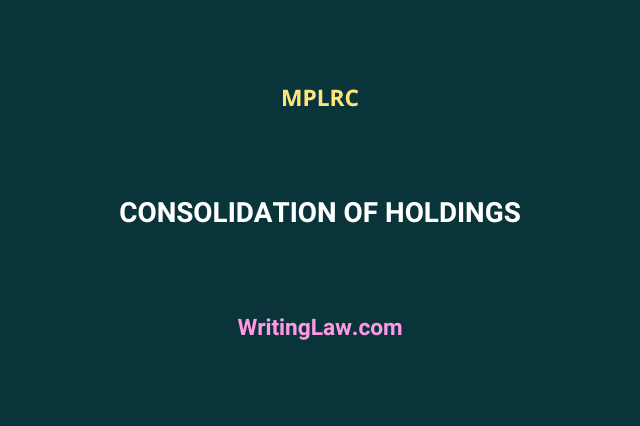
Consolidation of holding is the process of redistribution and allotting continuous plots to Bhumiswami (owner of the land or owner of the rights in the land) for his convenience of cultivation. To put it simply, consolidation of land holdings is the process of bringing together various pieces of land and merging them into a single piece of land.
Under the Madhya Pradesh Land Revenue Code (MPLRC), the state government has the authority to make rules to carry out the provisions of the consolidation of holdings.
Further, the provisions related to the consolidation of holdings are given under Chapter XVI of the MPLRC.
This article helps you understand the definition, process, and more related to the consolidation of holdings as provided by the Madhya Pradesh Land Revenue Code.
Definition of Consolidation of Holdings
Section 205 of the Madhya Pradesh Land Revenue Code defines the consolidation of holdings and consolidation officers. Accordingly, consolidation of holdings refers to the redistribution of all or part of a village’s land in order to allot to the Bhumiswami continuous plots of land for convenience of cultivation.
The revenue officer not below the rank of Tahsildars is known as the Consolidation Officer. They are appointed by the state government.
Process of Consolidation of Holding
Section 206 of the MPLRC deals with the process of consolidation of holding. To begin, any two or more Bhumiswamis in a village having together more than or equal to the minimum area of land as provided under section 221 of the Madhya Pradesh Land Revenue Code can apply in writing for consolidation of holding. The application should be made to the consolidation officers. The district’s Collector can direct, order, or instruct the consolidation officers to investigate the feasibility or efficiency of consolidating holdings in any village.
Further, if two-thirds of the Bhumiswamis in a village apply for their holdings to be consolidated, the application is considered to be made on behalf of all the Bhumiswamis in a village. Similarly, if two-thirds of the Bhumiswamis in the village agree to the consolidation during an investigation, the application is considered to be made on behalf of all the Bhumiswamis. And, if any scheme of consolidation of holding is confirmed in such a case, it will be binding on all Bhumiswamis in the village.
Rejection and Admission of Application
The consolidation officer can submit the application to the Collector with a recommendation that it be rejected or denied in whole or in part or to quash the proceedings. Such an application can be made upon receipt of any such application or at any point during the proceedings where it appears that there are good and sufficient reasons for the application to be rejected.
Further, upon receiving the consolidation officer’s recommendation, the Collector may accept it and issue orders accordingly. The consolidation officer also has the authority to issue an order for further investigation. According to section 208 of the MPLRC, if the consolidation officer accepts the application, he must follow the procedure laid down under MPLRC.
Preparation of Scheme for Consolidation of Holding
The provision related to the preparation of a scheme for consolidation of holding is given under section 209 of the Madhya Pradesh Land Revenue Code. If Bhumiswami submits a scheme of consolidation along with the application, the consolidation officer reviews it and, if necessary, makes changes. And if no such scheme is submitted with the application, the consolidation officer will be required to prepare one.
Further, if the consolidation officer believes that redistribution of land following a scheme of consolidation will result in the allotment of a holding or land of less market or productive value to any Bhumiswami; in this case, the scheme may provide for compensation to be paid to such Bhumiswami by whoever or whatever the consolidation officer directs.
Furthermore, when the scheme of consolidation is complete, the consolidation officer has to submit it to the Collector for approval after considering and removing any objections that may have arisen.
Confirmation of Scheme
According to section 209 of the Madhya Pradesh Land Revenue Code, when the scheme of consolidation is complete without any objection, the consolidation officer submits it to the Collector. After the submission of the report to the Collector, the Collector may either:
- Confirm the scheme
- Direct the consolidation officer for the modification
- Refuse the scheme after considering the objections
Procedure After Confirmation of the Scheme
Following ratification of the scheme of the consolidation, the consolidation officer will demarcate the boundaries of holdings if necessary. He will then announce the final decisions as per the scheme, including a new field map, record-of-rights, Nistar Patrak, and Wajib-ul-arz.
Power to Make Rules
The state government has the authority to make rules under section 221 of the Madhya Pradesh Land Revenue Code with regard to the following:
- Specifying the minimum area of land that anyone applying for consolidation of holdings must own.
- Providing for the particulars to be contained in each application for the consolidation of holding.
- Providing procedures that the consolidation officer must follow while dealing with the application.
- Providing for the formation and appointment of any advisory committee or Panchayat to help the consolidation officer in the examination or preparation of the scheme.
- Determining the amount of compensation to be paid in cases falling under section 209 of the MPLRC.
- Regulating the assessment of costs.
- Determining the market or productive value of the various holdings and lands included in any scheme of consolidation.
Read Next:
- Appeal, Revision and Review Under MPLRC
- Revenue Board Under Madhya Pradesh Land Revenue Code
- Law of Mutation Under the Madhya Pradesh Land Revenue Code
- Understanding the Legislative Branch of the Indian Government - 6th May 2024
- Appointment, Oath, and Removal of Constitutional Posts in India - 28th April 2024
- Powers of Income Tax Authorities in India - 26th April 2024







